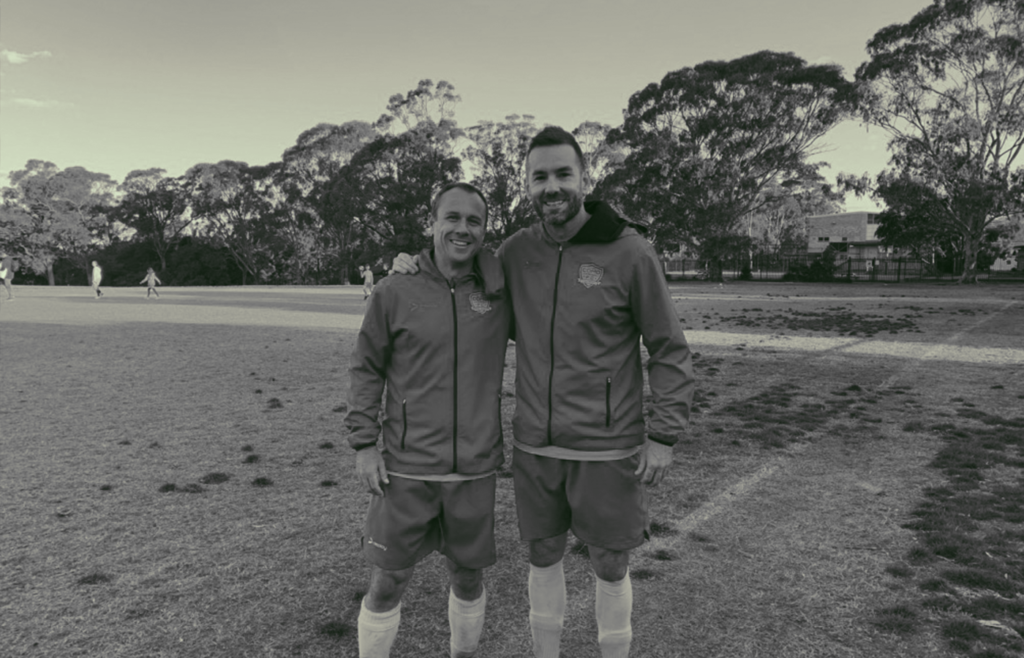An unexpected blow to the head in a charity match was the catalyst for Dean Heffernan’s pursuit of a revolutionary solution to address the growing concern around concussion in professional football.
In the latest episode of the PFA’s Podcast, Footballers’ Voice, Heffernan joins host and former Daily Football Show’s Adrian Houghton, sharing details of the ‘scary moment’ when he was concussed in a charity match against Manchester United Legends in 2017.
Despite being his first concussion – after avoiding a single incident of head trauma during his 12-year A-League career – Heffernan was badly concussed and hospitalised when former Northern Ireland international Keith Gillespie landed an off-the-ball elbow.
The unsavoury incident occurred when Manchester United Legends played an Australian Legends team in Perth to promote the Dylan Tombides Foundation.
“It was a scary moment because… I’d never been concussed before. I’ve never had that feeling of memory loss. It was a little bit frightening to a certain extent; a couple of my good mates were right next to me at the time in Matt Thompson and Jacob Burns and they said that I was just looking straight through them.
“It was like I wasn’t even there. I was standing up and I got to the bench – carried to the bench – and I looked up at the scoreboard and saw it was around 70-odd minutes and we were 3-0 up, but at that moment, I had no idea where I was or that I’d been involved in a game.”
After suffering acute and delayed symptoms – including headaches, memory loss and cracked teeth – and considering emerging research that indicated professional footballers are at increased risk of head trauma, Heffernan decided to take action and revolutionise heading in training through the development of a new, lightweight football.
The initiative comes at a time when the game seeks to address the broader issue of head trauma in football, following the 2019 FIELD study by the University of Glasgow. That study revealed former professional footballers are three-and-a-half times more likely to suffer from dementia, had a five-fold increase in the risk of Alzheimer’s, a four-fold increase in motor neurone disease, and a two-fold increase in Parkinson’s disease.
A number of football associations globally have reduced or banned heading entirely at junior levels to mitigate the potential long-term effects of heading. For Heffernan, a former PFA Player Development Manager, the inspiration for ‘HeadingPro’ only increased when observing his son’s football training.
“As time went on and my kids were at an age where they were wanting to head a football a lot more… I just didn’t like the fact that I had to keep saying ‘no’. I thought to myself, how [are they] ever going to know how to head a football? Because [they’re] going to have to do it eventually.”
Instead of removing the art of heading entirely, Heffernan, alongside Andrew Head, who specialises in the product development of footballs, and backed up by research by Dr Kerry Peak, ‘HeadingPro’ reduces head acceleration by up to 50 per cent and is 40% lighter than other regulated balls, providing an alternative to allow players to continue heading the ball, but in a safer manner.

“There are a whole lot of studies… that show how much the incidence of heading increases with the age groups. I felt like a light-weight ball could be something that we could use to help make it safer.
“I think as clubs, as coaches and parents, that’s the key message from us as a business… that we just want to make it safer for players, we honestly believe that we’ve got a duty of care to do that.
“I’ll continue to try and spread the word not only about the ball, but concussion and education around that, because I think as time goes on and people are more and more cognizant of the fact that there are effects from it and that we can make it safer. And there’s like we said, there’s two options; you can use the light ball or we can ban it altogether. I don’t think just banning it from training is the answer.
“[Banning heading] is just going to create fear to a certain extent and possibly even more problems when we get into those teenage years for players.”
In his role as the Western Sydney Wanderers’ W-League Head Coach, Heffernan is also ensuring that his knowledge, research and initiative in the area of concussion extends to protecting his current playing squad.
“In the W-League we’re making sure that we have a [concussion] baseline test of all the players because you’ve got to have something to be able to refer to if something does happen on the field.”
To listen to Heffernan discuss the HeadingPro initiative, subscribe to Footballers’ Voice via Spotify and Apple.







